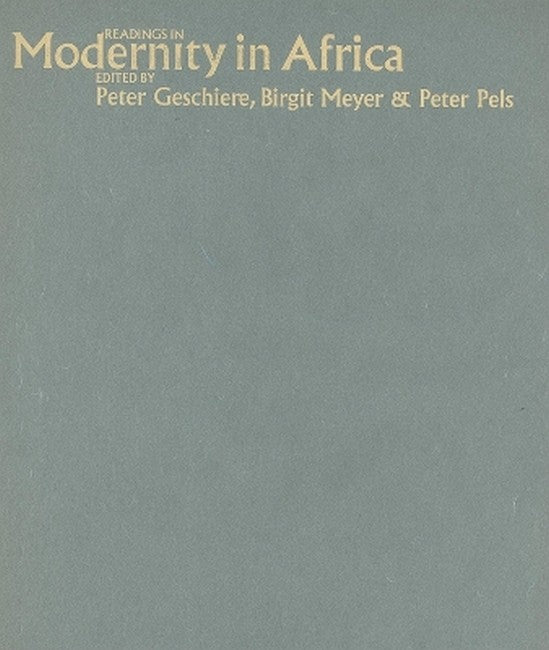Peter Geschiere is Professor of African Anthropology at the University of Amsterdam. Birgit Meyer is Professor of Cultural Anthropology at the Free University, Amsterdam. Peter Pels is Professor of Social and Behavioural Sciences at the University of Leiden.
Request Academic Copy
Please copy the ISBN for submitting review copy form
Description
Notes on Contributors Sources and Acknowledgments Introduction: Genealogies of Modernity in Africa, by Peter Geschiere, Birgit Meyer, and Peter Pels Part 1. Genealogies of "Modernity" in Africa Introduction to Part 1 A. From "Modernization" to "Modernity" Introduction "Global Disconnect: Abjection and the Aftermath of Modernism," by James G. Ferguson Excerpts from Modernization: Protest and Change, by S. N. Eisenstadt "Fanti National Constitution: Administrative Questions," by John Mensah Sarbah B. The Loss of Development's Meta-Narrative Introduction The World Bank's Changing Discourse on Development: From Reliance on the State and "Modernizing Elites" to "Bypassing the State," collage from World Bank texts, 1972-1989 Excerpts from Anthropology and Development: Understanding Contemporary Social Change, by Jean-Pierre Olivier de Sardan Excerpts from "Buying Futures": The Upsurge of Female Entrepreneurship-Crossing the Formal/Informal Divide in Southwest Cameroon, by Margaret Niger-Thomas C. The Modern Production of Tradition Introduction "Report of the Expedition Sent by the Government of Natal to Instal Cetywayo as King of the Zulus," by Theophilus Shepstone "Ujamaa: The Basis of African Socialism," by Julius Kambarage Nyerere "The African Renaissance, South Africa and the World," by Thabo Mbeki "The Pidginization of Luguru Politics: Administrative Ethnography and the Paradoxes of Indirect Rule," by Peter Pels "The Resurgence of Chiefs: Retribalism and Modernity in Post-1994 South Africa," by Lungisile Ntsebeza "Chiefs! Law, Power, and Culture in Contemporary South Africa," by Barbara Oomen D. Identity and Personhood in Africa Introduction "The African Road to Socialism," by Leopold Sedar Senghor "Society and Ideology," by Kwame Nkrumah "African Identities," by Kwame Anthony Appiah "Missionary Fact and Politics of the Belly: A Foucaultian Reading," by Jean-Francois Bayart "Rheumatic Irony: Questions of Agency and Self-Deception as Refracted through the Art of Living with Spirits," by Michael Lambek Part 2. Ethnographies of the Modern in Africa Introduction A. Dynamics of Governmentality "The New Africans: Between Nativism and Cosmopolitanism," by Achille Mbembe "Staging Politisi: The Dialogics of Publicity and Secrecy in Sierra Leone," by Mariane Ferme B. The City "Tales of the 'Invisible City' and the Second World," by Filip de Boeck "On the Worlding of African Cities," by Abdoumaliq Simone C. Technology "Degraded Images, Distorted Sounds: Nigerian Video and the Infrastructure of Piracy," by Brian Larkin "Kwaku's Car: The Struggles and Stories of a Ghanaian Long-Distance Taxi Driver," by Jojada Verrips and Birgit Meyer D. Modernity's Enchantment "Witch-Hunting and Political Legitimacy: Continuity and Change in Green Valley, Lebowa, 1930-1991," by Isaac A. Niehaus "The Convert: Act One Scene III and Act Two Scene III," by Francis Nyamnjoh "Introduction," by Allen F. Roberts and Mary Nooter Roberts E. New Figures of Success: Beyond the Modern? Excerpts from Entre Paris et Bacongo, by Justin-Daniel Gandoulou "Evolues and Feymen: Old and New Figures of Modernity in Cameroon," by Basile Ndjio "A Successful Life in the Illegal Realm: Smugglers and Road Bandits in the Chad Basin," by Janet Roitman Index
"This is a fascinating and valuable book with a mix of reprinted contributions from well-known non-archaeological Africanist scholars such as, for instance, Allen Roberts and Mary Nooter Roberts, Peter Pels, and Marianne Ferme." -Journal of African Archaeology, Vol. 7, no. 2 "Few other books zero in on central questions to do with what we mean by 'modernity,' its multiple and bewildering manifestations in contemporary Africa, and the scholarly debates around the application of the concept to the non-Western world." -Karin Barber, University of Birmingham

